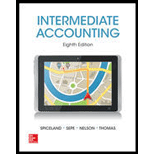
INTERMEDIATE ACCOUNTING
8th Edition
ISBN: 9780078025839
Author: J. David Spiceland
Publisher: McGraw-Hill Education
expand_more
expand_more
format_list_bulleted
Question
Chapter 17, Problem 17.6E
To determine
Projected benefit obligation (PBO): This is the estimated present value of future retirement benefits, accumulated based on the future compensation levels.
To compute: Service cost from the given values of changes in PBO
Expert Solution & Answer
Want to see the full answer?
Check out a sample textbook solution
Students have asked these similar questions
Can you explain the correct methodology to solve this general accounting problem?
If Salaries and Wages Expense is $536,800 during the year and the beginning and ending balances of Salaries and Wages Payable are $32,400 and $28,900, respectively, the cash paid to employee’s is__.
Please provide the correct solution to this financial accounting question using valid principles.
Chapter 17 Solutions
INTERMEDIATE ACCOUNTING
Ch. 17 - Prob. 17.1QCh. 17 - Prob. 17.2QCh. 17 - Prob. 17.3QCh. 17 - What is the vested benefit obligation?Ch. 17 - Prob. 17.5QCh. 17 - Prob. 17.6QCh. 17 - Name three events that might change the balance of...Ch. 17 - Prob. 17.8QCh. 17 - Prob. 17.9QCh. 17 - Prob. 17.10Q
Ch. 17 - The return on plan assets is the increase in plan...Ch. 17 - Define prior service cost. How is it reported in...Ch. 17 - Prob. 17.13QCh. 17 - Is a companys PBO reported in the balance sheet?...Ch. 17 - What two components of pension expense may be...Ch. 17 - Prob. 17.16QCh. 17 - Evaluate this statement: The excess of the actual...Ch. 17 - Prob. 17.18QCh. 17 - TFC Inc. revises its estimate of future salary...Ch. 17 - Prob. 17.20QCh. 17 - Prob. 17.21QCh. 17 - Prob. 17.22QCh. 17 - The components of postretirement benefit expense...Ch. 17 - Prob. 17.24QCh. 17 - Prob. 17.25QCh. 17 - Prob. 17.26QCh. 17 - Prob. 17.1BECh. 17 - Prob. 17.2BECh. 17 - Prob. 17.3BECh. 17 - Prob. 17.4BECh. 17 - Prob. 17.5BECh. 17 - Prob. 17.6BECh. 17 - Prob. 17.7BECh. 17 - Prob. 17.8BECh. 17 - Prob. 17.9BECh. 17 - Prob. 17.10BECh. 17 - Net gain LO176 The projected benefit obligation...Ch. 17 - Prob. 17.12BECh. 17 - Prob. 17.13BECh. 17 - Prob. 17.14BECh. 17 - Prob. 17.15BECh. 17 - Prob. 17.1ECh. 17 - Prob. 17.2ECh. 17 - Prob. 17.3ECh. 17 - Prob. 17.4ECh. 17 - Prob. 17.5ECh. 17 - Prob. 17.6ECh. 17 - Prob. 17.7ECh. 17 - Prob. 17.8ECh. 17 - Prob. 17.9ECh. 17 - Prob. 17.10ECh. 17 - Prob. 17.11ECh. 17 - Prob. 17.12ECh. 17 - Prob. 17.13ECh. 17 - Prob. 17.14ECh. 17 - Prob. 17.15ECh. 17 - Prob. 17.16ECh. 17 - Prob. 17.17ECh. 17 - Prob. 17.18ECh. 17 - Prob. 17.19ECh. 17 - Prob. 17.20ECh. 17 - Prob. 17.21ECh. 17 - Prob. 17.22ECh. 17 - Prob. 17.23ECh. 17 - Prob. 17.24ECh. 17 - Prob. 17.25ECh. 17 - Prob. 17.26ECh. 17 - Prob. 17.27ECh. 17 - Prob. 17.28ECh. 17 - Prob. 17.29ECh. 17 - Prob. 17.30ECh. 17 - Prob. 17.31ECh. 17 - Prob. 17.32ECh. 17 - Prob. 17.33ECh. 17 - Prob. 1CPACh. 17 - Prob. 2CPACh. 17 - Prob. 3CPACh. 17 - Prob. 4CPACh. 17 - Prob. 5CPACh. 17 - Prob. 6CPACh. 17 - Prob. 7CPACh. 17 - Prob. 8CPACh. 17 - Prob. 1CMACh. 17 - Prob. 2CMACh. 17 - Prob. 17.1PCh. 17 - Prob. 17.2PCh. 17 - Prob. 17.3PCh. 17 - Prob. 17.4PCh. 17 - Prob. 17.5PCh. 17 - Prob. 17.6PCh. 17 - Prob. 17.7PCh. 17 - Prob. 17.8PCh. 17 - Prob. 17.9PCh. 17 - Prob. 17.10PCh. 17 - Prob. 17.11PCh. 17 - Prob. 17.12PCh. 17 - Prob. 17.13PCh. 17 - Prob. 17.14PCh. 17 - Prob. 17.15PCh. 17 - Prob. 17.16PCh. 17 - Prob. 17.17PCh. 17 - Prob. 17.18PCh. 17 - Prob. 17.19PCh. 17 - Prob. 17.20PCh. 17 - Prob. 17.21PCh. 17 - Prob. 17.1BYPCh. 17 - Prob. 17.2BYPCh. 17 - Prob. 17.3BYPCh. 17 - Prob. 17.5BYPCh. 17 - Prob. 17.6BYPCh. 17 - Prob. 17.8BYPCh. 17 - Prob. 17.9BYPCh. 17 - Prob. 17.10BYPCh. 17 - Prob. 17.12BYPCh. 17 - Prob. 1AFKC
Knowledge Booster
Similar questions
- Please help me solve this general accounting question using the right accounting principles.arrow_forwardI am looking for a step-by-step explanation of this financial accounting problem with correct standards.arrow_forwardCan you solve this general accounting question with accurate accounting calculations?arrow_forward
- Elba Industries recently reported an EBITDA of $12.5 million and a net income of $3.7 million. It had $3.2 million in interest expense, and its corporate tax rate was 40%. What was its charge for depreciation and amortization?arrow_forwardPlease explain the correct approach for solving this general accounting question.arrow_forwardI am trying to find the accurate solution to this general accounting problem with the correct explanation.arrow_forward
- Brightview Components Ltd. expected an overhead cost of $425,000 for its packaging cost pool and an estimated 17,000 packaging operations. The actual overhead cost for that cost pool was $460,000for 18,200 actual packaging operations. The activity-based overhead rate (ABOR) used to assign the costs of the packaging cost pool to products is __arrow_forwardElba Industries recently reported an EBITDA of $12.5 million and a net income of $3.7 million. It had $3.2 million in interest expense, and its corporate taxrate was 40%. What was its charge for depreciation and amortization?arrow_forwardPedro Manufacturing expects overhead costs of $360,000 per year and direct production costs of $15 per unit. The estimated production activity for the 2023 accounting period is as follows: 1st 2nd 3rd 4th Quarter Units Produced 10,000 9,500 8,000 10,500| The predetermined overhead rate based on units produced is (rounded to the nearest penny): a. $9.47 per unit b. $10.00 per unit c. $8.05 per unit d. $11.25 per unitarrow_forward
arrow_back_ios
SEE MORE QUESTIONS
arrow_forward_ios
Recommended textbooks for you
 Intermediate Accounting: Reporting And AnalysisAccountingISBN:9781337788281Author:James M. Wahlen, Jefferson P. Jones, Donald PagachPublisher:Cengage Learning
Intermediate Accounting: Reporting And AnalysisAccountingISBN:9781337788281Author:James M. Wahlen, Jefferson P. Jones, Donald PagachPublisher:Cengage Learning

Intermediate Accounting: Reporting And Analysis
Accounting
ISBN:9781337788281
Author:James M. Wahlen, Jefferson P. Jones, Donald Pagach
Publisher:Cengage Learning
